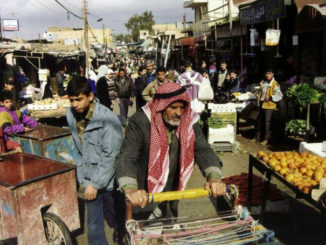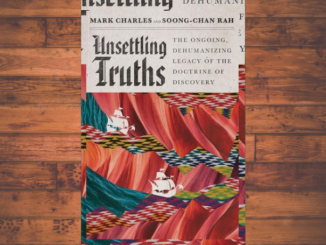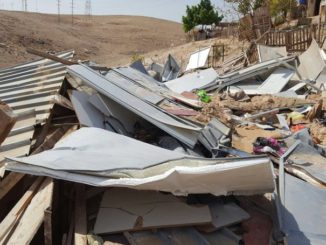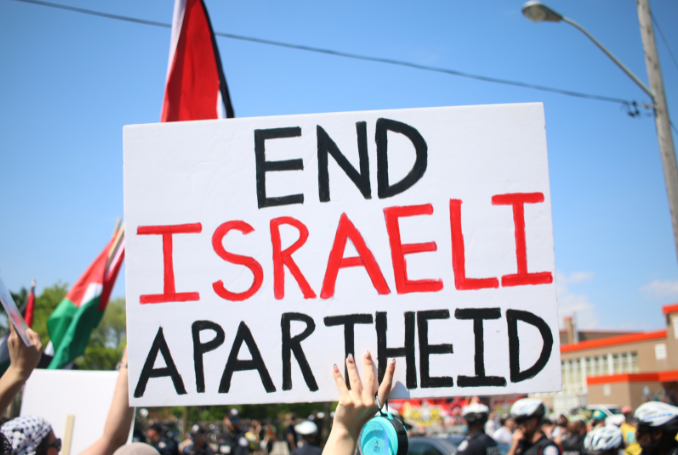
Last May I was at a counterdemonstration to the annual Walk With Israel event in Toronto. The demonstration, comprised of pro-Palestinian protestors, walked to a field where part of the event was happening. It was behind a school and festive, with loud music and entertainment.
When those in attendance saw us standing across the street they came up to the fence on their side. Between us were police officers ensuring that no side would get too close to the other, preventing anything like violence from occurring.
Still both sides, for hours, yelled and gestured angrily at one another. This was no surprise. When defenders of Israel face off with Palestinian ones you cannot expect a calm or happy situation.
What I found troubling however was the amount of young people, some children, who were on the pro-Israeli side, expressing utter disdain and hatred for Palestine—verbally and otherwise. None of the adults cautioned them to stop. In fact they encouraged it indirectly by expressing the same.
It’s as if they were validating the young people’s hate, something I fear has left an impression on them such that today—wherever they are—they feel or believe it’s “right” to be an anti-Palestinian racist. (Not surprisingly perhaps the field was near the mailing address of the Canadian Antisemitism Education Foundation (CAEF), expressly anti-Palestinian and which I wrote about here.)
It also, metaphorically, seemed as if the devil was present, prompting the young people to recall and express warped ideas they had about Palestine. Instead of seeing our side as ultimately fighting for universal justice they—perhaps mimicking their parents, teachers, the adult world where Zionism teaches hatred for Palestine—saw it as a “threat” to their existence.
Paralleling this is an observation made by Jorge Mario Bergoglio (Pope Francis) in his trenchant philosophical work, The Way of Humility:
“It is the devil himself who sows suspicion in people’s hearts in order to divide them from one another. … When the devil sows suspicion, he tries to convince us by means [of] fallacies, or half truths, to manipulate our hearts into selfish convictions that lead us into a world closed off from all objectivity.
“Suspicion, sown by the devil, sets up in the heart a crooked measuring rod, which displaces reality. It is not easy to straighten out a religious [person] who is tempted by the possession of a crooked measure of this kind. It is no longer a question of sorting out this or that wrong idea, but a whole hermeneutic—the way he interprets everything. Everything that happens he interprets in a twisted way, because the measure he applies to it is itself crooked.”
By analogy, Zionism teaches its followers to see Palestine as an “evil”, something to be eliminated, contained, guarded against but never to merge with, let alone harmoniously, into one democratic and humane society. For the same reason any just society must ensure, at the very least, that public educational institutions are free from the promotion of Zionism.
Does that mean there is no place for Zionism in school curricula? Not quite. But it has to be honest about what it is and not what Zionists want the world to believe about it. If, as many of its proponents claim, it were truly about establishing and preserving a Jewish homeland—without brutalizing the Palestinian or any other people—there’d be nothing wrong with it. Especially after the antisemitic horrors and atrocities of the Second World War, responsible not only for the murder of millions of Jews but displacing them internationally, such a homeland ought to be welcomed or honored by the world.
No “home” of any kind however can exist where violence and dehumanization against an Indigenous population is rife. You can call it whatever you want—hell, nightmare, dystopia—but again it is not a home. It is the site of unnecessary suffering and misery that must be eliminated so that people, be they Jewish or Arab, can live together as equals. On this basis can people celebrate, not despise, unique differences among one another.
There is progress in York Region, a suburban area of Toronto, to ensure students will—where it is present—come to see what Zionism actually is. Recently there was a push in the region’s school board to adopt the International Holocaust Remembrance Alliance (IHRA) definition of antisemitism, which is often used to unfairly silence, censor and discipline those critical of Zionism. Thankfully the board did not adopt it, a move commended by Independent Jewish Voices Canada (IJV).
It is also important to amplify and keep alive discussions about why this happens. In the process people will be able to see that the IHRA definition, whatever its merits, one that Zionism employs to hide what Israel is doing, violently and in contravention to international law, to the Palestinian people. And young people have a right—the operative word here being “right”—to not be left in the dark or lied to about that. A good education is about, yes, inspiring students about the great things that humanity does and how perhaps they can emulate them outside the classroom, creating a more fair, just and equitable society.
But it is also, while being mindful of their sensitivities (so as not, for example, to compromise their mental health or even traumatize them), about illuminating to them the atrocities that human beings have been and are still responsible for. We do them an absolute disservice when we wholly avoid that, which includes failing to present Zionism as a settler-colonial project, responsible for the widespread misery, suffering and dispossession of the Palestinian people. That means implicating Israel as a perpetrator. And one to boot, to the ire of any person of conscience (as I discussed with Google whistleblower Ariel Koren recently), that enjoys impunity and the multibillion dollar support of other imperialist powers such as the United States.
We often hear about the need for their to be an “ideal” or “appropriate” way to talk about Israel in schools. There is nothing inherently wrong with having such a discussion, especially as it—if genuinely a discussion and not simply an opportunity to smear pro-Palestinian efforts—contains the possibility of showing precisely how Zionism oppresses (e.g. through administrative detentions of Palestinian children, without charge). Less often however do we hear about the challenges that Palestinian students, as well as their allies, unnecessarily have to face in schools.
That includes here in Toronto where they experience unwarranted pushback for peaceful expressions of Palestinian solidarity. The intent of the pushback is clear: repress such solidarity to the point where Palestinians are not allowed to have a public identity of their own. Should such a sinister tactic succeed the very idea of Palestinians as having any identity at all will be thrown into question.
Edward Said articulates this well in in After the Last Sky: Palestinian Lives:
“Identity—who we are, where we come from, what we are—is difficult to maintain in exile. Most other people take their identity for granted. Not the Palestinian, who is required to show proof of identity more or less constantly. It is not only that we are regarded as terrorists, but that our existence as native Arab inhabitants of Palestine, with primordial rights there (and not elsewhere), is either denied or challenged. And there was more. Such as it is, our existence is linked negatively to encomiums about Israel’s democracy, achievements, excitement; in much Western rhetoric we have slipped into the place occupied by Nazis and anti-Semites; collectively, we can aspire to little except political anonymity and resettlement; we are known for no actual achievement, no characteristic worthy of esteem, except the effrontery of disrupting Middle East peace.”
The failure of educational institutions in Canada to adequately address this, let alone introduce curricula that highlights the achievements and resilience of the Palestinian people, is frankly a stain on the country. This is all the more so as Canada presents itself and claims to be “democratic”, which—whether in its educational or institutions—includes and does not marginalize ethnic identities.
Moreover, officials within these institutions cannot cite ignorance or not knowing about what Said describes, especially in 2022 where there’s been a groundswell of international support for the Palestinian struggle for justice. Students are entitled to an education where they learn about that struggle for what it is: a liberation project. Anything less, such as framing it as one side of a “war” or “conflict” with Israel, is dishonest. It distorts the material reality of our world.
Surely this opposes the essential definition education, namely to “lead out of darkness.” Every young person ought to have that opportunity. Those intent on confusing them about Palestine, falsifying its past (e.g. denying the Nakba) and present (e.g. its subjugation under Israeli apartheid), need to be kept away from schools.
Schools, like Palestine, are not supposed to be—mentally or physically—sites of colonization. They are meant to be free.
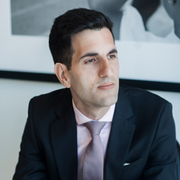
– Paul Salvatori is a Toronto-based journalist, community worker and artist. Much of his work on Palestine involves public education, such as through his recently created interview series, “Palestine in Perspective” (The Dark Room Podcast), where he speaks with writers, scholars and activists. He contributed this article to The Palestine Chronicle.




